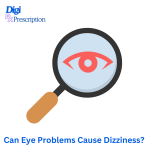
Dizziness is a common complaint that can have many causes, including inner ear issues, low blood pressure, and neurological disorders. However, one often-overlooked cause of dizziness is eye problems. Since our vision plays a crucial role in maintaining balance and spatial awareness, any disruption in visual function can lead to dizziness, vertigo, and unsteadiness.
In this blog post, we’ll explore how eye problems can cause dizziness, the common vision-related conditions linked to dizziness, and tips for managing these issues.
How Can Eye Problems Cause Dizziness?
The eyes and brain work together to help us maintain balance. The brain receives visual input from the eyes and combines it with information from the inner ear (vestibular system) and proprioception (body position awareness). When vision is impaired or disrupted, the brain struggles to process this information correctly, leading to dizziness, lightheadedness, or vertigo.
Some common ways eye problems contribute to dizziness include:
✔ Blurred vision: Makes it difficult for the brain to process movement and spatial orientation.
✔ Eye strain: Prolonged focus on screens or reading can cause headaches and dizziness.
✔ Binocular vision dysfunction: When the eyes don’t work together properly, it can cause depth perception issues and unsteadiness.
✔ Vestibular-ocular reflex dysfunction: If the coordination between the eyes and inner ear is off, it can lead to vertigo.
Common Eye Problems That Cause Dizziness
1. Refractive Errors (Uncorrected Vision Problems)
Refractive errors, such as nearsightedness, farsightedness, and astigmatism, can cause dizziness if not properly corrected with glasses or contact lenses.
✔ Symptoms: Blurred vision, headaches, and difficulty focusing.
✔ Solution: Regular eye exams and updated prescription lenses.
2. Binocular Vision Dysfunction (BVD)
BVD occurs when the eyes do not align or coordinate properly, causing strain on the brain. This leads to dizziness, double vision, and difficulty judging distances.
✔ Symptoms: Headaches, vertigo, difficulty reading, nausea, and unsteady walking.
✔ Solution: Prism glasses or vision therapy can help correct the misalignment.
3. Eye Strain (Digital Eye Strain or Computer Vision Syndrome)
Prolonged screen time or reading in poor lighting can strain the eye muscles, leading to dizziness and discomfort.
✔ Symptoms: Eye fatigue, blurred vision, dry eyes, and light sensitivity.
✔ Solution: Follow the 20-20-20 rule (every 20 minutes, look 20 feet away for 20 seconds) and use blue light filters.
4. Vestibular-Ocular Disorders
If there is a disconnect between vestibular signals and vision, dizziness can occur.
✔ Symptoms: Vertigo, difficulty focusing while moving, and motion sickness.
✔ Solution: Vestibular therapy and eye exercises may help improve coordination.
5. Migraines and Ocular Migraines
Some people experience dizziness with ocular migraines, which cause temporary vision disturbances.
✔ Symptoms: Flashing lights, blind spots, sensitivity to light, and nausea.
✔ Solution: Avoid migraine triggers (caffeine, stress, dehydration) and consider medical treatment if frequent.
6. Glaucoma and Increased Eye Pressure
Glaucoma is a condition where increased eye pressure damages the optic nerve, sometimes causing dizziness and vision loss.
✔ Symptoms: Peripheral vision loss, headaches, nausea, and dizziness.
✔ Solution: Regular eye exams to monitor eye pressure and medication to control the condition.
7. Vertigo and Nystagmus (Involuntary Eye Movements)
Conditions like benign paroxysmal positional vertigo (BPPV) and nystagmus cause involuntary eye movements, leading to dizziness and balance issues.
✔ Symptoms: Spinning sensation, trouble focusing, and unsteady gait.
✔ Solution: Vestibular therapy and certain eye exercises can help manage symptoms.
How to Reduce Dizziness from Eye Problems
✔ Get Regular Eye Exams: Uncorrected vision issues are a major cause of dizziness. See an optometrist if you experience persistent dizziness.
✔ Use Proper Prescription Lenses: Wearing the wrong glasses or contacts can make dizziness worse. Ensure your prescription is up to date.
✔ Take Breaks from Screens: Follow the 20-20-20 rule to reduce eye strain.
✔ Improve Lighting Conditions: Avoid dim lighting when reading or working on screens.
✔ Practice Eye Exercises: Vision therapy and exercises can strengthen eye muscles and improve focus.
✔ Manage Underlying Conditions: If migraines, glaucoma, or vestibular disorders contribute to dizziness, consult a specialist for treatment.
Conclusion
Yes, eye problems can cause dizziness, and ignoring vision-related symptoms can make balance issues worse. Whether it's an uncorrected vision issue, eye strain, or a more complex condition like BVD or glaucoma, addressing the root cause can significantly improve your quality of life. If you experience persistent dizziness, consult an eye doctor or neurologist to rule out serious conditions and find the right treatment.
References:
-
American Academy of Ophthalmology (AAO) – Vision and Balance Disorders – https://www.aao.org
-
National Eye Institute (NEI) – Common Eye Conditions – https://www.nei.nih.gov
-
Vestibular Disorders Association (VeDA) – Vision and Dizziness – https://vestibular.org
-
Mayo Clinic – Ocular Migraines and Dizziness – https://www.mayoclinic.org
